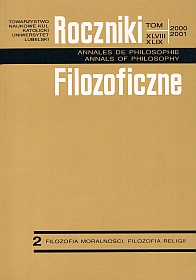Freedom and truth. From general knowledge to philosophy
Abstract
Western societies are becoming increasingly multicultural, with many different concepts of freedom. This is a symptom of a crisis in Western culture. At the same time, multiculturalism is also one of the causes of this crisis.
The author believes truth can overcome this crisis. A new culture must therefore be formed – the culture of truth, rooted in philosophical and Christian wisdom. Only the "culture of truth" can be the foundation of the "civilization of love".
Knowing the truth about human freedom calls for the truth about all reality, that is, the truth that can be learned in a philosophy strengthened by the truth revealed by Christ. In philosophy, we learn that God is the Creator of the whole world: He is Love – the Giver of being, truth, good and beauty.
Ultimately, therefore, freedom is given to man by God, so that we, as persons (men or women) may achieve the fullness of being.
The foundation of human freedom is therefore God, who created everything that exists, which is conceived by God-the Supreme Truth, and thus has its own "ontological truth". Reality is also wanted by God – the Supreme Good, and therefore everything is good and we can love it. Reality is also created by God the Supreme Beauty, and therefore everything that exists is beautiful and we can admire it.
The transcendental properties of all that exists, rooted in God, give freedom to man. The lack of immediate obviousness of the transcendental is the most profoundreason for the falsification of human freedom.
References
Baudrillard J., Le crime parfait, ed. Galilée, Paris 1995 (la traduction en italien par G. Piana, ed. Raffaello Cortina, Milano 1996).
RivettiBarbò F., Al di là della crisi delle verità, dans „La cultura europea del XX secolo. Le sue crisi e oltre”, Atti del Seminario di Cadenabbia, 18-20 aprile 1986, ed. Konrad Adenauer Stiftung, Urbino, 1987, pp. 153-156.
RivettiBarbò F., Dall'essere-pregnante all'Assoluto-che-dona, II. L'ascesa, dans „Rivista di Filosofia neoscolastica”, LXXI, 1979, fasc. 2o, pp. 245-289.
RivettiBarbò F., Dubbi, discorsi, verità. Lineamenti di filosofia della conoscenza, Jaca Book, Milano 19851, 19912.
RivettiBarbò F., Essere nel tempo. Introduzione alla filosofia dell'essere, fondamento di libertà, Jaca Book, Milano 1990.
RivettiBarbò F., La fondazione della libertà umana: Dio-Amore, dans A. Piolanti (curatore), Atti del IX Congresso Tomistico Internazionale „San Tommaso d'Aquino, Doctor Humanitatis”, 24-29 sett. 1990, vol. I, Libreria Editrice Vaticana, Città del Vaticano 1991, pp. 224-236.
RivettiBarbò F., L'Assoluto è Amore-Vivente, „Aquinas”, 1988, n. 1, pp. 137-145.
RivettiBarbò F., Libertà e fondazioni della bioetica: di fronte al morire, dans S. Biolo (curratore), „Nascita e morte dell'uomo. Problemi filosofici e scientifici della bioetica”, Atti del 46o Convegno docenti universitari, Centro studi filosofici di Gallarate, 4-6 aprile 1991, Marietti, Genova 1993, pp. 231-237.
RivettiBarbò F., Lineamenti di antropologia filosofica, Jaca Book, Milano 1994.
RivettiBarbò F., Semantica bidimensionale. Fondazione filosofica, con un progetto di teoria del significanto, ed. Elia, Roma 1974.
RivettiBarbò F., Speranza e verità, tra filosofia classica ed escatologia, dans „Rivista di Filosofia neo-scolastica”, LXXXVI, 1994, pp. 749-760.
Rosmini A., Apologetica, Milan 1840, „Prefazione”, cit. dans „Charitas”, anné LXX, mai 1996, pp. 150-151.
Spinoza B., Éthique, P. 1, def. 1.
Copyright (c) 2001 Roczniki Filozoficzne

This work is licensed under a Creative Commons Attribution-NonCommercial-NoDerivatives 4.0 International License.





